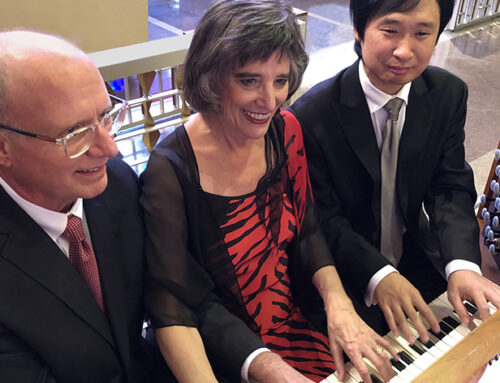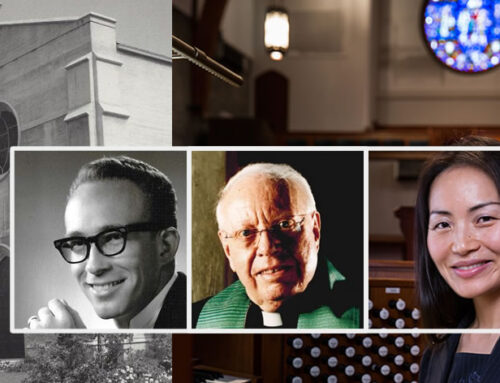Have I truly been working here for 30 years? Only yesterday I was auditioning for the Associate Organist-Choirmaster position…
When the Director of Music, Ray Egan, had decided I was the candidate, we met together with the Rector, George Regas. George expressed his belief that staff members who really make a difference stay at least three years, and I responded that I really liked to establish roots where I work. And as I stand here today, I think it is fair to say that I honored that commitment.
I’ve been asked to reflect today on those 30 years of music ministry and on my vocation as a musician working in the church. So, let me start with one of my earliest memories, being baptized, somewhere around the age of three, at First Presbyterian Church in Santa Monica — the church where my parents were married, raised their family and faithfully served all of their lives.
I vividly remember being held up in front of the congregation, seeing all those people, and bursting forth in a blood-curdling scream. This initiation established a life-long — and deeply emotional — relationship with the church.
Here I am, over 50 years later. I love Jesus more deeply than ever. And, I still love his often wild and wacky church.
How did I come to All Saints? The very early chapters of my journey formed me and led me to my vocation and ultimately to this place.
Early Years
Since my very dramatic Baptismal Day, I have attended church virtually every week of my life. As a kid, it wasn’t an option. My dad was a deeply spiritual man, and my parents made church life the centerpiece of our family life. I loved Sunday School, learning the great stories of the Bible and of this man called Jesus.
Music took a role in my life, almost immediately — with Kindergarten Choir at the church and piano lessons at home.
A turning point came when I was 11. The woman who was to become my mentor was hired as organist-choirmaster at First Presbyterian in 1968, and my life was changed forever.
Marcia Hannah Farmer was a life-long Episcopalian and truly a trail-blazer in her profession. Women, of course, were not priests in the 1950s and 60s, when Marcia was in school and beginning her career — and women were not organist-choirmasters in the Episcopal Church at that time either, at least not in any major church position.
She was talented, dedicated, pastoral, spiritually-grounded and tenacious, and for many years had a well-respected career in the Episcopal Church. In 1968, after an unlikely sequence of events, she was led to First Presbyterian.
I remember, with the greatest joy, singing in those various choirs over the following six years, under Marcia’s direction — rehearsing, creating beauty together, and offering it in worship. In making music I experienced so many thrilling moments of communion with God. I can still recall the physical sensation of singing a high A as a boy soprano — a dynamic column of air rising through the body with such intensity that I thought it might just push through the top of my head.
As my voice changed, I did what many good choristers do; I began studying organ, at the age of 13. I fell in love with this instrument and cherished those hours of practice every day after school.
I believe that a large part of music-making is about communion with those who composed the music we bring to life — centuries ago, or yesterday. This music-making is a mysterious and intimate relationship between human spirits. I am so connected to Johann Sebastian Bach, a church musician, organist and choirmaster born nearly 300 years before me.
Especially as the years have passed, I have come to appreciate at an even deeper level the gifts Marcia gave me as a mentor in church music. She recognized my potential, teaching, encouraging, prodding, challenging, and drawing the music out of me in such a way that I could grow to be a leader. She taught me that my talent is a gift from God, and that in cultivating my gifts and sharing them with others God is glorified.
I knew, at the age of 15, that I wanted to be an organist-choirmaster. I even wrote a paper about it for a high school guidance class assignment on career options — which seems weird to me now. And as I reflect on those high school years, it is also important to note that being eccentric — literally out of the circle — became important in my spiritual formation. I was not only a painfully shy, chubby, completely un-athletic nerd and loner who went to church every afternoon to practice the organ, but a homosexual, for God’s sake.
As painful as it can often be, it really helps to have the experience of being “the other”, at least in some way, as you seek to follow the one who embraces and includes all. I have come to recognize it as a gift, which has guided and informed my ministry and my faith journey all these years. I am so grateful that I had music, particularly music in worship, as a creative outlet through which to communicate feelings which I couldn’t possibly utter.
This passage from Psalm 42 evokes this time in my life: “As the deer longs for the water-brooks, so longs my soul for you, O God.”



Leave A Comment